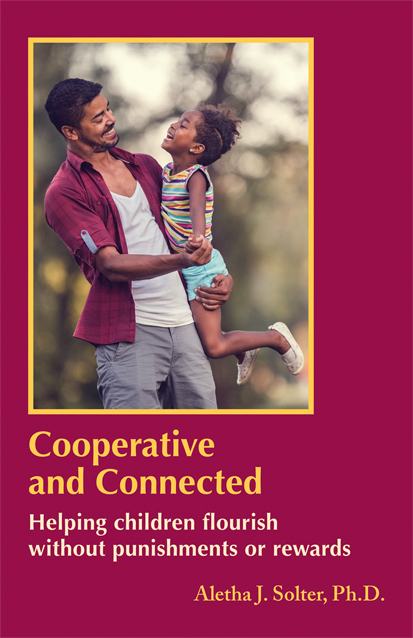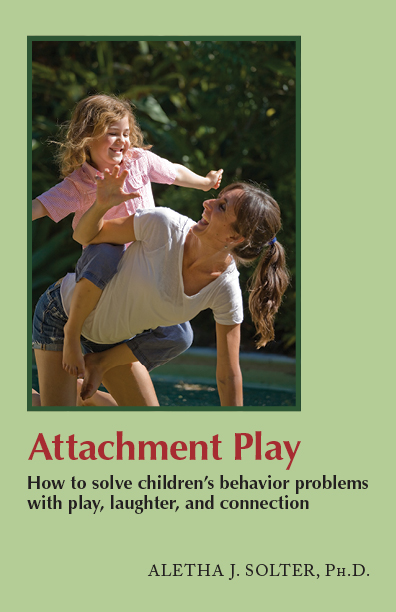Compulsive behavior in six-year-old
by Aletha Solter, Ph.D.
Question:
My daughter, age six, has started to show signs of compulsiveness in her clothing and school work. Her socks HAVE to be the same length, or her skirt is the wrong color, etc. Even when we choose clothes the night before, some days it takes the entire family just to get her dressed in the morning.
At school, she will spend so much time perfecting one assignment that she runs out of time to complete the rest. How do my husband and I teach her the importance of task management without squelching her desire to do her best work? Thanks.
Answer:
I suggest, first of all, looking for the underlying causes of your daughter's behavior. I'll begin with the first part of your question: compulsiveness in regards to her clothing. I can think of several possible reasons for this behavior.
- Children who are under stress sometimes become compulsive in their habits. They try to exert control in certain areas of their life (and sometimes even adopt rituals) when they feel powerless, confused, scared, or guilty about bigger issues. Has there been unusual stress for your daughter, such as starting a new school, a move to a new home, birth of a sibling, or parental stress of any kind?
- A difficult social situation at school could also be the cause of this behavior. Is your daughter being teased or excluded by other children at school? Compulsiveness in her clothing could be an indication that she is worried about "fitting in" at school to be accepted by her peers.
- You mention that it sometimes takes the entire family to get her dressed in the mornings. Perhaps this is your daughter's way of drawing attention to herself. This would imply that she is not getting enough attention. Be sure to fill her legitimate need for good quality, individul attention on a daily basis so she won't need to seek attention in inappropriate ways (such as dawdling).
- Sometimes parents give young children too many choices, and overemphasize the importance of those choices. The children begin to feel overburdened with the decisions they must make. Limiting the choices to two items of clothing might help this situation and be a relief to your daughter.
Choose a moment when both of you are relaxed and unrushed, and talk with your daughter about the dressing problem. Express your needs, and ask her if she has any ideas for ways to make the morning routine go more quickly. Perhaps her motivations and needs will become clearer if you give her a chance to talk. Try to find a solution together that satisfies both of you.
As for your daughter's perfectionism in school, I don't see that as a problem, but rather as an asset. Schools often rush children from one activity to another, with the result that the children learn to complete their work in a sloppy and superficial manner. Such a system discourages creativity, depth of thinking, neatness, and conscientiousness.
I suggest that you have a conference with your daughter and her teacher and that you begin by validating her for her conscientious approach to school work. Together, you can discuss ways to prioritize tasks. Perhaps the teacher can let her know what is most important to do first. She should not be punished in any way for working more slowly than other children.
Another thing to consider is that the behaviors you describe are fairly typical of highly sensitive children, who often agonize over decisions and are very conscientious. If your daughter is a highly sensitive person, try to accept her as she is and realize that she will feel less stressed and do better in life if she is not rushed. Her sensitivity may cause her to take any correction or criticism very seriously, leading to perfectionishm. Try to avoid correcting her too much at home. At school, it might help if her teacher lets her know that "rough drafts" are sometimes okay, and that a few mistakes are not harmful. Teachers feel it is their job to correct mistakes, but in your daughter's case, this might not always be helpful.
You can help reduce her anxiety about making mistakes by playing a therapeutic game with her in which you act incompetent, stupid, and forgetful while pretending that you have forgotten how to do simple tasks such as tying your shoe. Or you can purposely make silly mistakes while playing a game with her or while doing some routine household chore. The purpose of these activities is to get her to laugh, which will help her release some of her own tensions and anxiety about making mistakes. It would also be beneficial for her to see you struggling to learn something new (such as a musical instrument) and accepting your own mistakes as part of the learning process.
One final possibility is that your daughter's behavior could indicate a learning disability such as dyslexia or dysgraphia. Children with these diagnoses can learn to read and write, but they need more time than other children to complete assignments, and they usually find school to be quite stressful. Her morning dawdling could reflect her wish to avoid or postpone school because she finds it so difficult. Mild forms of dyslexia or dysgraphia are often overlooked. It might be wise to ask her teacher about this possibility and perhaps have her evaluated. I am generally not in favor of diagnosing or labeling children. However, in the case of a genuine learning disability, an official diagnosis would allow her to receive the support and accommodations she needs to succeed in school and work at her own pace. Or perhaps an alternative school would better meet her need to work at her own pace.
About Aletha Solter:
Aletha Solter, PhD, is a developmental psychologist, international speaker, consultant, and founder of the Aware Parenting Institute. Her books have been translated into many languages, and she is recognized internationally as an expert on attachment, trauma, and non-punitive discipline.
Aware Parenting is a philosophy of child-rearing that has the potential to change the world. Based on cutting-edge research and insights in child development, Aware Parenting questions most traditional assumptions about raising children, and proposes a new approach that can profoundly shift a parent's relationship with his or her child. Parents who follow this approach raise children who are bright, compassionate, competent, nonviolent, and drug free.

